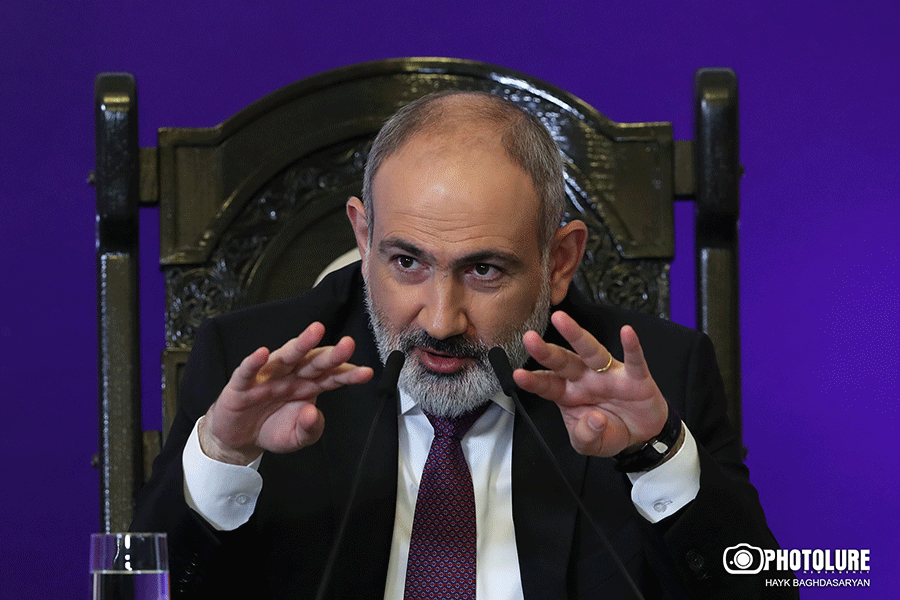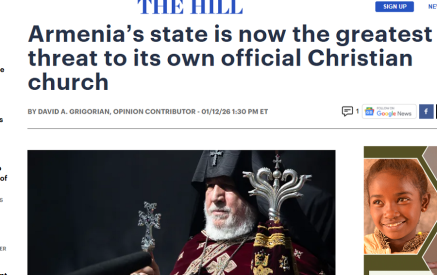by Stepan Piligian
In corporate life, when a company experiences performance issues relative to shareholder expectations, there are usually a plethora of reasons offered for their failure. It could be the general market condition, the national economy, not executing the sales forecast or unpredictable expenses. Regardless of the labeling offered, accountability belongs with those designated to produce results. They are the appointed or elected leaders of the company, and often poor results are referred to simply as a “management problem.”
Depending on the environmental circumstances, the management may be afforded an opportunity to correct the problems and improve performance before a management change is considered. The same concept is applied in governments, institutions and non-profits in our Armenian community, although the accountability and the change process is quite different. These three pillars are the drivers of the Armenian global nation today.
Read also
The government of the Republic of Armenia is our primary reference to sovereign governments. Some democracies, such as the United States, elect their leader (president) for four years. The primary mechanism for accountability is the checks and balances provided by the three branches of the government. The ultimate process is, of course, the election itself where the citizens have the final say. There are rare circumstances of impeachment within a term.
To date a sitting President has never been removed. In a parliamentary system, many nations have a “no confidence” provision where a prime minister can be removed forcing the majority party to offer a new candidate or call for new parliamentary elections. In the Armenian community, our most prominent institution is the church. The leader of the church, the Catholicos, is elected by an assembly of lay and clergy.
This is a very unique process since Catholicoi remain in office usually until their earthly life concludes. The diaspora organizations are essentially a loose confederation of major international organizations (ARF, ARS, AGBU, etc.) and regional groups of nonprofits that may be active in one or more host countries. Cooperation and coordination is self-motivated only as there are no formal interorganizational mechanisms. There have been a few recent attempts organized by the High Commissioner of the Diaspora and also the Future Armenian initiative to integrate the global Armenian nation, particularly the diaspora and the homeland.
In my travels within our community, whether in the diaspora or the homeland, within the church or the secular arenas and particularly among volunteer-based organizations, we often hear of what many term the “leadership crisis.” I have participated in numerous panel discussions and focus groups on our challenges as a community, and the overwhelming consensus centers around leadership. The leadership crisis can take many forms – corruption, ineptness or simply a power motivation that neutralizes impact. The perception from the constituents becomes the reality.
For example, when there is a financial accountability issue and the public trust is compromised, reconciliation may take years. Public views on leadership may be directed towards individual elected officials such as Prime Minister Pashinyan, someone indirectly elected by a representative forum such as Catholicos Karekin II or towards elected governing bodies such as the ARF Bureau, the AGBU BoD or numerous regional church bodies and nonprofit groups. Of course, being held accountable by the public can be a fickle process as it may be fed by fact, conjecture or rumors. We tend to focus on personalities rather than systemic causes. Regardless there is a definitive frustration with our leadership that is connected to the direction of our global nation.
The Prime Minister is unpopular currently based on his foreign policy “peace agenda.” He is addressing very sensitive subjects with our enemies. Some polls suggest a majority of the population in Armenia is opposed to the concessions and the direction of the negotiations. We know how the people of Artsakh feel as they have expressed their views consistently and publicly on the issues of self-determination.
Based on the expressions of the diaspora press, public events and organizational statements, there seems to be general disappointment in the western diaspora. Frequently, disagreement is a reflection of a separation between leaders and those they have been elected to serve. Armenia’s government has been fairly isolated internally. They control the parliament and other sectors of the society.
They don’t seem to be in a collaborative mood by avoiding the inviting of “opposition” leaders into the dialogue. Armenia has never really had a political opposition and this a major shortcoming in developing democratic institutions. Political groups opposed to the sitting government is not the definition of an opposition. The opposition parties have rarely had a critical mass of MPs sufficient to enable healthy tension in the legislative process.
The current and previous administrations have controlled the Parliament with one party domination. In 2018 with the advent of the Pashinyan era, Armenia simply traded the Republican Party for the Civil Contract Party. There were a few exceptions, but by and large opposition parties either lose their legislative mandates or remain a substantial minority. This changes all the dynamics of checks and balances essential to a functioning democracy. In 2021, a little over six months after the devastating loss in the 44-day war, the Armenian people re-elected the administration most blamed for the loss with a substantial majority.
Despite the humiliation of the war, most Armenians saw the choices as the current regime versus a return to the past. They chose the current administration as having less risks. Many at the time advised Pashinyan not to interpret this as a mandate given the limited choices. He has approached his term as a mandate which has only further heightened the political conflict. Now many Armenians who elected him are frustrated. We can blame Pashinyan, but we also need to understand the price we pay for systemic weaknesses. The majority of political parties in Armenia have no parliamentary mandate, so they are relegated to small public rallies and using the media. They have no role in the governing process. For a country with widespread opinions, there is little diversity in the government. Governments change as we learned in 2018, but the check and balances are essential to policies that connect common citizens to their leaders. The process today is too centered around personalities and not policies. Leadership comes from articulating a vision that connects people together in a productive direction. Compassion is a critical element of patriotism.
I am very disheartened by the duplicity of the thinking in our church. Our Catholicos in Holy Etchmiadzin is controversial in terms of his management and leadership. None of the exalted democratic forums in the church will touch the issue, but it is commonly discussed informally. A substantial number of Armenians will not send money to Etchmiadzin because they are concerned about accountability. Our people are anxious and fearful, yet the church leadership is reluctant to immerse itself in what they consider “internal” matters. Transparency is essential to garnering trust. In its absence, perception rules the day. These are issues of national importance not limited to “politics.”
Recently, the church issued a clear statement on its opposition to the government’s Artsakh policy. Outstanding, but too little and way too late. Statements are great, but isn’t that what we are tired of getting from outsiders? Now we are supposed to be inspired by a ceremonial statement from the church. How about the clergy leading a peace march to the Artsakh border in the name of our Christian faith and heritage? Leadership is something people need to experience that impacts their lives. Our faithful in America have not received a pontifical visit from the Catholicos of All Armenians in many years – long enough that our young generation have no recollection. There have been numerous “private” visits with selective meetings with no public itinerary. Why? Our leaders have this responsibility to spiritually feed their flock. Sometimes leadership is just about being accessible and visible. Karekin I of blessed memory understood this superbly. If our leaders expect respect, support and followers, they need to be visible, accountable and compassionate to the needs of common Armenians.
We are all distraught over this scandal emerging at the Patriarchate in Jerusalem. Patriarch Nourhan has been complimented for his commitment to strengthening the Armenian Holy presence in Jerusalem. The news of the controversial leasing of strategic land to an outsider for development has sent shockwaves through the community. From a leadership standpoint you can’t have it both ways. You can’t defrock a priest for his role and not take responsibility for all decisions as the leader. This type of experience damages the trust of people in their leaders beyond our tolerance. Why do some leaders think they are above reproach? In the matters of the church we often confuse respect for the position of clergy with holding all leaders accountable. Most of the laity would rather discuss controversies in an informal capacity rather than confronting them in a transparent manner that could prevent problems. In communal life, most of us do not want to be relegated to a “troublemaker” that could disrupt our social standing. We are more comfortable on the periphery of known issues and as a result have to accept some of the responsibility.
It is essential to internalize that when we exit the dialogue due to distractions or not caring, we are enabling the leadership crisis. I recently read a post by digital journalist Wally Sarkeesian that 100,000 Armenians were enjoying the current wine festival but few would go to Republic Square to protest. My sense is that the political instability over the years has given way to ambivalence because most people feel they can’t change anything.
This is very dangerous for a democracy. Pashinyan is a politician, and as such, when he sees limited public opposition, he would naturally take it as an endorsement or at least a cautionary green light. The crisis of leadership can emerge anywhere in our global nation. How many times have we seen leaders in our diaspora motivated by power and egos versus compassion for our people? We hear the rhetoric but we have seen too many good minds exit the scene due to a lack of compassion by our leaders to bring our people together.
Power and authority can be great enablers or can be tragic distractions. When retaining power becomes the main objective, the people are usually on the short end. We are all citizens of the Armenian nation: diaspora, homeland, secular, spiritual, organizational and individuals. As such, we each have a responsibility to encourage, mentor and nurture each other for the betterment of our global community. We also have the responsibility to, with a pure heart, speak up when leadership and authority are estranged from the mission. Focusing on individuals feeds our need for gossip, but the mission is the only variable that counts. Don’t turn your back on our challenges.























































